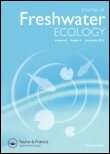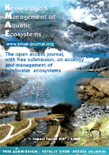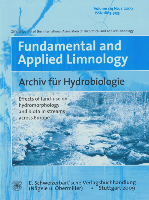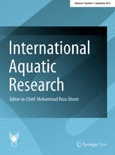
LAKE AND RESERVOIR MANAGEMENT
Scope & Guideline
Innovating management practices for lakes and reservoirs.
Introduction
Aims and Scopes
- Ecosystem Management:
Research on the management of aquatic ecosystems, including strategies for maintaining biodiversity, water quality, and habitat integrity. - Impact of Human Activities:
Studies examining the effects of anthropogenic activities such as agriculture, urbanization, and recreation on lake and reservoir health. - Invasive Species Dynamics:
Investigations into the introduction, spread, and ecological impacts of invasive species within freshwater systems. - Water Quality Assessment:
Research focused on monitoring and improving water quality in lakes and reservoirs, including the study of pollutants and nutrient dynamics. - Hydrological and Sediment Dynamics:
Analysis of the physical processes affecting lakes and reservoirs, including sedimentation, hydrology, and the effects of climate change. - Community Engagement in Management:
Exploration of community involvement in lake management practices, promoting public awareness, and stakeholder participation.
Trending and Emerging
- Technological Advancements in Monitoring:
There is an increasing focus on using advanced technologies, such as drone imagery and imaging flow cytometry, for monitoring lake ecosystems and detecting harmful algal blooms. - Climate Change Impacts:
Research addressing the effects of climate change on lake ecosystems, including changes in water levels, temperature, and species distribution, is gaining prominence. - Nutrient Management Strategies:
Emerging studies on innovative nutrient management practices and their effectiveness in controlling eutrophication and improving water quality are becoming more common. - Community Science and Engagement:
The role of community science initiatives in monitoring and managing lakes is increasingly highlighted, reflecting a trend towards participatory management approaches. - Multi-Stressor Impact Assessments:
There is a growing emphasis on understanding the cumulative effects of multiple stressors (e.g., invasive species, pollution, climate change) on lake ecosystems.
Declining or Waning
- Historical Ecology Studies:
Research focusing on the historical ecology of lakes, such as paleolimnology, appears to be less frequently published, possibly due to the increasing emphasis on contemporary management issues. - Traditional Water Quality Models:
The use of conventional models for evaluating water quality and nutrient loading in lakes has seen a decline, as new methodologies and technologies emerge. - Local Case Studies:
While localized studies once dominated the journal, there is a noticeable decrease in papers focusing solely on specific lakes or regions, potentially in favor of broader, more generalized studies.
Similar Journals

Inland Water Biology
Unveiling the Secrets of Aquatic LifeInland Water Biology is a distinguished peer-reviewed journal published by MAIK NAUKA/INTERPERIODICA/SPRINGER, focusing on the intricate interactions within freshwater ecosystems. With its ISSN (1995-0829) and E-ISSN (1995-0837), this journal has established itself as an essential resource for researchers and professionals in the fields of Aquatic Science and Ecology, evidenced by its consistent ranking in the Q3 category for both disciplines in 2023. Covering a wide array of topics related to the biology of inland waters, the journal aims to disseminate cutting-edge research findings and theoretical advancements that contribute to the understanding of aquatic environments and their ecological significance. Although it does not offer open access, its impact in the academic community is noteworthy, ensuring that published works undergo rigorous peer review. Researchers, professionals, and students alike will find valuable insights and innovative approaches within its pages, making Inland Water Biology a vital addition to their academic endeavors.

JOURNAL OF FRESHWATER ECOLOGY
Illuminating the pathways of freshwater ecosystem health.JOURNAL OF FRESHWATER ECOLOGY, published by Taylor & Francis Inc, is an esteemed source of research dedicated to advancing the understanding of freshwater ecosystems. Established in 1981, this Open Access journal has provided a platform for innovative studies and groundbreaking articles relevant to the fields of Aquatic Science and Ecology. With its HIndex reflecting a commitment to quality scholarship, the journal is currently classified in the Q3 category for both Aquatic Science and Ecology, Evolution, Behavior and Systematics, indicating its respectable impact within these disciplines. The journal ranks within the 45th percentile in Ecology and the 41st percentile in Aquatic Science on Scopus, highlighting its relevance to a global audience of researchers and practitioners. By facilitating unrestricted access to research findings since 2017, JOURNAL OF FRESHWATER ECOLOGY aims to enrich our understanding of freshwater systems and their conservation, making it an essential resource for those invested in ecological research and environmental sustainability.

MARINE AND FRESHWATER RESEARCH
Advancing knowledge in marine and freshwater science.Marine and Freshwater Research is a prestigious journal published by CSIRO PUBLISHING that serves as a key platform for the dissemination of cutting-edge research in the fields of Aquatic Science, Ecology, and Oceanography. With an impactful presence since its inception in 1948, the journal provides critical insights into the dynamics of freshwater and marine ecosystems, promoting interdisciplinary approaches that contribute to our understanding of biodiversity and sustainability. Currently ranked in the Q2 category across major scientific domains, including Ecology and Aquatic Science, it enjoys a robust academic reputation supported by impressive Scopus rankings, such as Rank #66/247 in Aquatic Science and Rank #44/145 in Oceanography, reflecting its high citation impact and relevance. While offering a subscription-based access model, the journal remains dedicated to fostering dialogue and innovation within the scientific community, aiming to bridge the gap between research findings and practical applications in environmental management. Located in Australia, Marine and Freshwater Research is an essential resource for researchers, professionals, and students dedicated to exploring the complexities of aquatic ecosystems and advocating for their preservation.

Knowledge and Management of Aquatic Ecosystems
Exploring the Depths of Aquatic KnowledgeKnowledge and Management of Aquatic Ecosystems, published by EDP SCIENCES S A, is a premier open-access journal dedicated to the interdisciplinary study of aquatic ecosystems. With an ISSN of 1961-9502 and an impressive history since 1928, this journal serves as a vital resource for researchers and professionals in the fields of Ecology, Aquatic Science, Water Science and Technology, and Nature Conservation. The journal has consistently achieved high rankings, including a Q2 classification in multiple categories, which underscores its significant contribution to the evolving landscape of aquatic research. With access options that promote widespread dissemination of knowledge, Knowledge and Management of Aquatic Ecosystems aims to bridge gaps in research, policy, and practical applications, making it an invaluable asset for students, researchers, and policymakers aiming for impactful solutions in aquatic management and conservation.

Fundamental and Applied Limnology
Discovering Biodiversity: Essential Insights for Ecological ProgressFundamental and Applied Limnology is an esteemed academic journal dedicated to the exploration of freshwater ecosystems, bridging the gap between fundamental research and practical applications. Published by E Schweizerbart'sche Verlagsbuchhandlung in Germany, this journal has been a vital resource in the fields of aquatic science and ecology since its inception in 2007. With its ISSN 1863-9135 and E-ISSN 1863-9135, it provides a platform for researchers to disseminate significant findings related to limnology, contributing to a rich understanding of freshwater biodiversity, water quality, and ecological interactions. Although currently rated in the Q3 quartile for aquatic sciences and ecology as per the 2023 rankings, it remains a valuable outlet for interdisciplinary research and practical insights, facilitating critical advancements in environmental management. Open access options enhance its visibility and accessibility, making it indispensable for researchers, professionals, and students alike who are committed to advancing the scholarship in freshwater studies. Engaging with this journal not only opens doors to the latest research findings but also fosters collaboration and innovation in the ecological community.

Inland Waters
Charting the Course for Aquatic Science ExcellenceInland Waters, published by TAYLOR & FRANCIS LTD, stands as a prestigious scholarly journal dedicated to the critical examination of freshwater ecosystems and their management. With an ISSN of 2044-2041 and an E-ISSN of 2044-205X, this journal boasts a remarkable Q1 ranking in both Aquatic Science and Water Science and Technology for 2023, reflecting its significant impact in the field. Researchers and professionals can benefit from its comprehensive coverage of cutting-edge research, methodological advancements, and policy implications concerning inland waters. Committed to disseminating valuable knowledge in a vital area of environmental science, Inland Waters aims to foster collaboration and promote innovative solutions for sustainable water management practices. As it continues through its converged years from 2012 to 2024, the journal remains an essential resource for those dedicated to advancing our understanding and stewardship of freshwater environments worldwide.

CALIFORNIA FISH AND GAME
Exploring California's Aquatic WondersCalifornia Fish and Game is a prominent journal dedicated to the fields of Animal Science and Aquatic Science, published by the California Fish and Game Editor. With its roots extending back to 1979, the journal has served as a vital platform for disseminating research focused on the wildlife and aquatic ecosystems of California and beyond. Recognized within the Q4 quartile for both Animal Science and Zoology and Aquatic Science, it provides critical insights and scholarly contributions, despite its comparative rankings within the respective categories. The journal, with an ISSN of 0008-1078 and an E-ISSN of 2331-0405, offers an invaluable resource for researchers, professionals, and students alike, looking to deepen their understanding of California's rich biodiversity and ecological challenges. For those interested in open access options, further details can be reviewed through the journal's platform. By fostering a community of inquiry, California Fish and Game plays an essential role in advancing knowledge and conservation efforts in the fields of interest.

Journal of Oceanology and Limnology
Bridging Disciplines for a Healthier PlanetJournal of Oceanology and Limnology, published by SCIENCE PRESS, is a premier academic journal dedicated to advancing the fields of oceanography and limnology. With an ISSN of 2096-5508 and E-ISSN 2523-3521, this journal has emerged as a vital resource since its inception, aiming to disseminate cutting-edge research and comprehensive studies on aquatic environments. Based in China and indexed with notable rankings in Scopus, including a Q2 category in Oceanography and a Q3 category in Water Science and Technology, this journal significantly contributes to knowledge in these crucial scientific disciplines. The H-index for the journal is currently being established, reflecting its evolving impact within the academic community. Moreover, the open access model promotes wider dissemination, ensuring that research findings are accessible to a global audience. Covering a diverse range of topics from ecosystem health to climate impact on water bodies, the Journal of Oceanology and Limnology aspires to foster interdisciplinary dialogue and innovation among researchers, professionals, and students engaged in understanding and preserving aquatic life.

International Aquatic Research
Bridging gaps in aquatic science through open access.International Aquatic Research, published by the Islamic Azad University, Tonekabon Branch, is a vital open-access journal dedicated to advancing the field of aquatic sciences since its inception in 2009. With an ISSN of 2008-4935 and an E-ISSN of 2008-6970, the journal plays a significant role in disseminating high-quality research findings from Iran and around the globe. It covers a broad range of topics in aquatic biology, fisheries science, and marine ecology, making it a valuable resource for researchers, professionals, and students alike. As of 2023, it ranks in the third quartile (Q3) of the aquatic science category with a Scopus rank of #138 out of 247 in Agricultural and Biological Sciences, reflecting its growing influence in the field. With a commitment to promoting scientific knowledge and fostering collaboration among aquatic research communities, International Aquatic Research is positioned as an essential platform for those dedicated to understanding and conserving marine and freshwater environments.

Limnology and Oceanography Letters
Advancing knowledge in aquatic ecosystems.Limnology and Oceanography Letters, published by WILEY, is an esteemed peer-reviewed journal dedicated to advancing our understanding of freshwater and marine systems. With an impressive Q1 ranking in both Aquatic Science and Oceanography, this journal has established itself as a pivotal resource for researchers, professionals, and students alike. Since its inception as an Open Access journal in 2016, it has provided unrestricted access to high-quality, innovative research articles that illuminate diverse aspects of aquatic ecosystems and their dynamics. With a publication history from 2016 to 2024 and a significant presence in Scopus rankings—placing it in the top 6% for Oceanography and the top 8% for Aquatic Science, this journal not only fosters scholarly communication but also encourages interdisciplinary collaboration. Addressing pressing issues related to water resource management, climate impact, and ecological integrity, Limnology and Oceanography Letters remains essential for those dedicated to the science of aquatic environments.